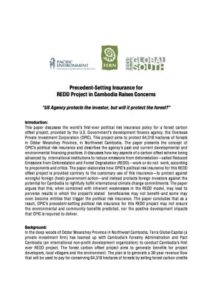20/06/2012
Under: Publications, The Commons
This paper discusses the world’s first-ever political risk insurance policy for a forest carbon offset project, provided by the U.S. Government’s development finance agency, the Overseas Private Investment Corporation (OPIC). This project aims to protect 64,318 hectares of forests in Oddar Meanchey Province, in Northwest Cambodia. The paper presents the concept of OPIC’s political risk insurance and describes the agency’s past and current developmental and environmental financing practices. It discusses how key aspects of a carbon offset scheme being advanced by international institutions to reduce emissions from deforestation—called Reduced Emissions from Deforestation and Forest Degradation (REDD)—work or do not work, according to proponents and critics. The paper elaborates how OPIC’s political risk insurance for this REDD offset project is provided contrary to the customary use of this insurance—to protect against wrongful foreign (host) government action—and instead protects foreign investors against the potential for Cambodia to rightfully fulfill international climate change commitments. The paper argues that this, when combined with inherent weaknesses in the REDD model, may lead to perverse results in which the project’s stated beneficiaries may not benefit–and some may even become entities that trigger the political risk insurance. The paper concludes that as a result, OPIC’s precedent-setting political risk insurance for this REDD project may not ensure the environmental and community benefits predicted, nor the positive development impacts that OPIC is required to deliver.
Uploaded June 20, 2012




![[IN PHOTOS] In Defense of Human Rights and Dignity Movement (iDEFEND) Mobilization on the fourth State of the Nation Address (SONA) of Ferdinand Marcos, Jr.](https://focusweb.org/wp-content/uploads/2025/07/1-150x150.jpg)

